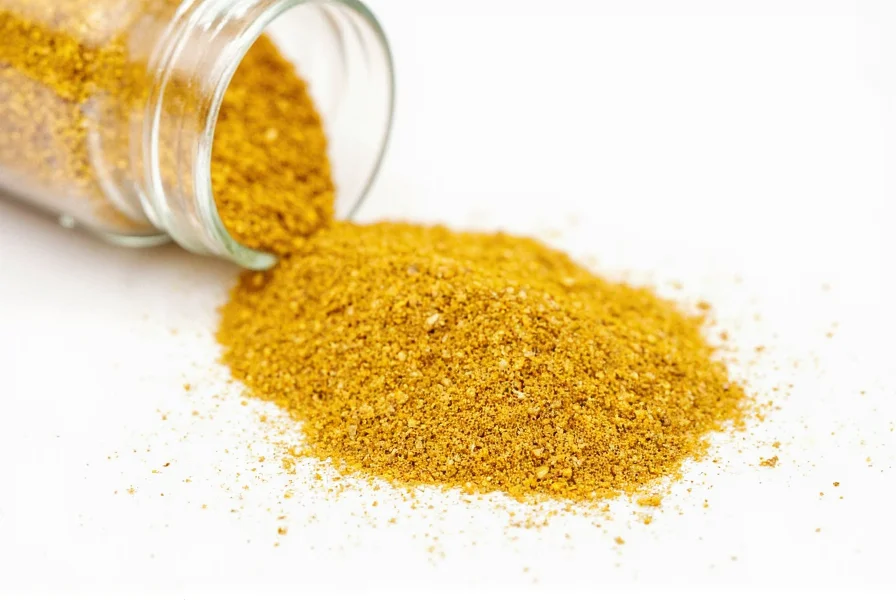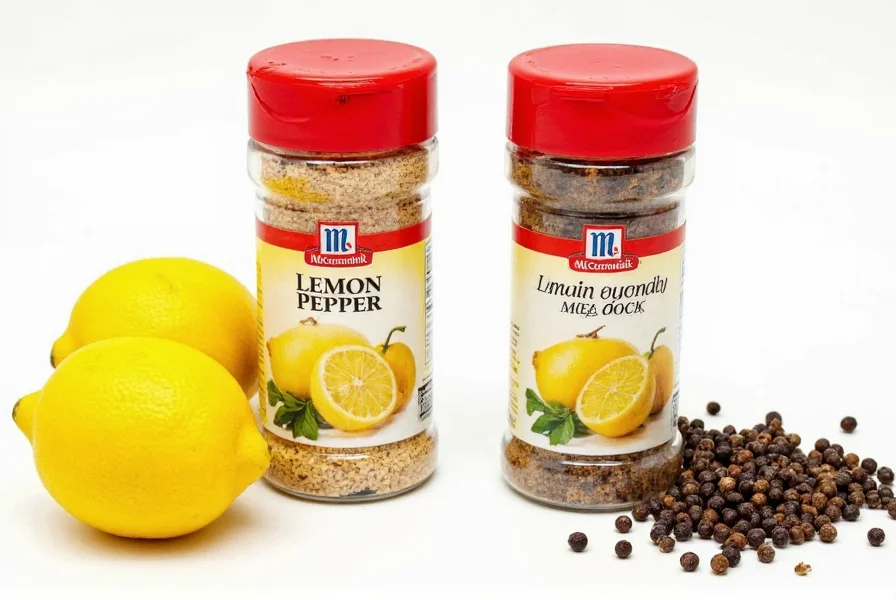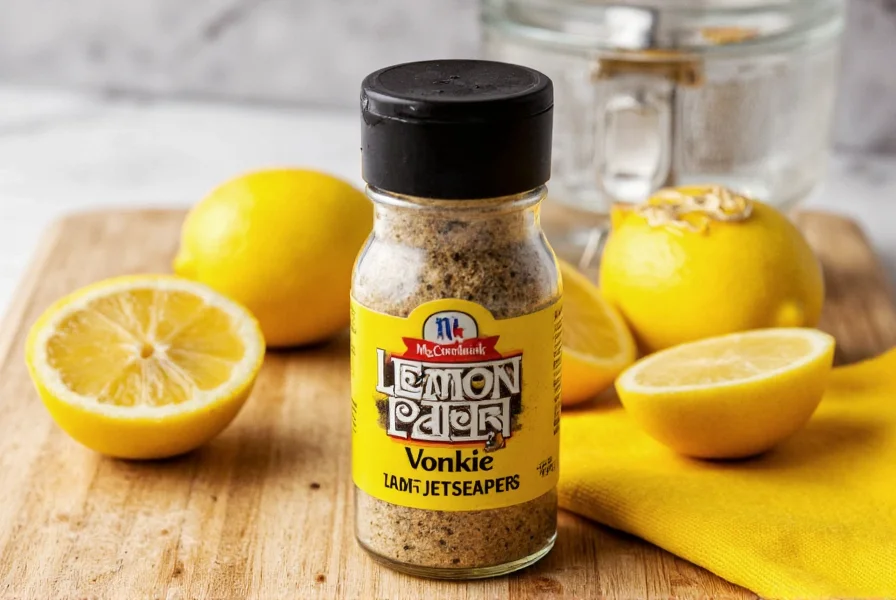McCormick Lemon Pepper seasoning has become a pantry staple for home cooks seeking quick flavor enhancement. This versatile blend combines the sharp brightness of lemon with the gentle heat of black pepper in a shelf-stable format. Understanding its composition and proper application can transform ordinary dishes into restaurant-quality meals with minimal effort.
Understanding McCormick Lemon Pepper Composition
Unlike homemade versions that require fresh lemons and whole peppercorns, McCormick's formulation uses specific ingredients to ensure consistent flavor and extended shelf life. The standard ingredient list includes:
| Primary Ingredients | Function | Percentage Range |
|---|---|---|
| Black Pepper | Provides heat and complexity | 40-50% |
| Dried Lemon Peel | Delivers citrus notes without moisture | 25-35% |
| Salt | Enhances flavor and acts as preservative | 15-20% |
| Citric Acid | Boosts perceived lemon flavor | 2-5% |
The careful balance between these components creates a seasoning that delivers immediate flavor impact without requiring additional preparation. The dried lemon peel undergoes a specialized dehydration process that concentrates the essential oils responsible for lemon's characteristic aroma, while the black pepper is coarsely ground to release volatile compounds that provide its distinctive heat.

Optimal Culinary Applications
Chefs and home cooks achieve best results with McCormick Lemon Pepper when applying it to appropriate dishes at the right stage of cooking. The seasoning works particularly well with:
- Fish and seafood - Apply before baking or broiling to create a flavorful crust
- Chicken dishes - Works exceptionally well with roasted or grilled preparations
- Vegetable sides - Toss with asparagus, green beans, or roasted potatoes
- Salad dressings - Mix with olive oil and vinegar for instant vinaigrette
For maximum flavor impact, add McCormick Lemon Pepper during the final 5-10 minutes of cooking. Adding it too early causes the volatile lemon compounds to evaporate, diminishing the citrus notes. When using with proteins, allow 15-20 minutes for the seasoning to penetrate before cooking for optimal flavor absorption.
McCormick Lemon Pepper versus Homemade Alternatives
While homemade lemon pepper offers freshness, McCormick's version provides consistent flavor and convenience. Consider these differences when deciding which to use:
- Shelf stability - McCormick lasts 2-3 years when stored properly, while fresh versions last only days
- Flavor consistency - Commercial blend delivers identical results batch after batch
- Convenience factor - Ready to use without preparation time
- Cost comparison - McCormick costs approximately $0.15 per serving versus $0.30+ for homemade
Professional chefs often use McCormick Lemon Pepper as a base, then enhance with fresh lemon zest for special occasions. This hybrid approach delivers both convenience and premium flavor characteristics.

Proper Storage Techniques for Maximum Freshness
To maintain McCormick Lemon Pepper's flavor profile throughout its shelf life, proper storage is essential. Follow these guidelines:
- Store in a cool, dark place away from heat sources like stoves or ovens
- Keep container tightly sealed after each use to prevent moisture absorption
- Avoid storing above 75°F (24°C) to prevent flavor degradation
- Do not keep near strong-smelling foods that could affect the seasoning
- Replace after 24 months for optimal flavor, even if container appears full
When stored properly, McCormick Lemon Pepper maintains its characteristic aroma and flavor intensity. Check for freshness by rubbing a small amount between your fingers - vibrant lemon scent indicates peak quality, while diminished aroma suggests it's time for replacement.
Common Usage Mistakes to Avoid
Many home cooks inadvertently diminish McCormick Lemon Pepper's effectiveness through common errors:
- Over-application - Using too much overwhelms delicate flavors (start with 1/4 teaspoon per serving)
- Early addition - Adding at beginning of cooking causes flavor loss
- Mixing with acidic components - Combining with vinegar or citrus juice creates bitter notes
- Using on strongly flavored proteins - Overpowering meats like lamb or game obscure the seasoning
For best results with McCormick Lemon Pepper seasoning, apply it to mild-flavored proteins and vegetables where its bright notes can shine through. Consider it a finishing seasoning rather than a base component in most applications.
Frequently Asked Questions
What are the exact ingredients in McCormick Lemon Pepper?
McCormick Lemon Pepper contains black pepper, dried lemon peel, salt, and citric acid. The specific formulation includes approximately 40-50% black pepper, 25-35% dried lemon peel, 15-20% salt, and 2-5% citric acid. No artificial flavors or preservatives are added to the standard formulation.
Can McCormick Lemon Pepper be used in place of fresh lemon and pepper?
While McCormick Lemon Pepper provides convenience, it shouldn't be considered a direct substitute for fresh ingredients. Use 1/2 teaspoon of the blend in place of 1 teaspoon fresh lemon zest and 1/4 teaspoon freshly ground pepper. Remember that the commercial blend already contains salt, so adjust additional salt accordingly in your recipes.
How long does McCormick Lemon Pepper stay fresh after opening?
When stored properly in a cool, dark place with the container tightly sealed, McCormick Lemon Pepper maintains optimal flavor for 18-24 months after opening. The dried lemon components begin to lose volatile compounds after this period, resulting in diminished citrus notes while the pepper elements remain relatively stable for longer.
What dishes work best with McCormick Lemon Pepper seasoning?
McCormick Lemon Pepper excels with mild-flavored proteins like chicken, fish, and shrimp, as well as vegetables including asparagus, green beans, and potatoes. It works particularly well in dishes where you want bright citrus notes without the moisture of fresh lemon. Avoid using it with strongly flavored meats like lamb or game, as the seasoning profile will be overwhelmed.
Is McCormick Lemon Pepper gluten-free and suitable for special diets?
Yes, standard McCormick Lemon Pepper is naturally gluten-free, vegan, and contains no artificial ingredients. Always check the specific product label as formulations can vary by region. The blend contains salt, so those on sodium-restricted diets should use it sparingly or look for McCormick's salt-free version which is also available in most markets.











 浙公网安备
33010002000092号
浙公网安备
33010002000092号 浙B2-20120091-4
浙B2-20120091-4